Fear not that thy life shall come to an end, but rather that it shall never have a beginning. – John Henry Newman
Regret is the emotion of wishing one had made a different decision in the past because the consequences of the decision were unfavorable. Regret is a negative emotion predicated on an upward, self-focus, counterfactual inference. (Gilovich and Medec 1995). Regret can also be defined as a negative, cognitively based emotion that we experience when realizing or imagining that our present situation would have been better had we acted differently (Zeelenberg 2010).
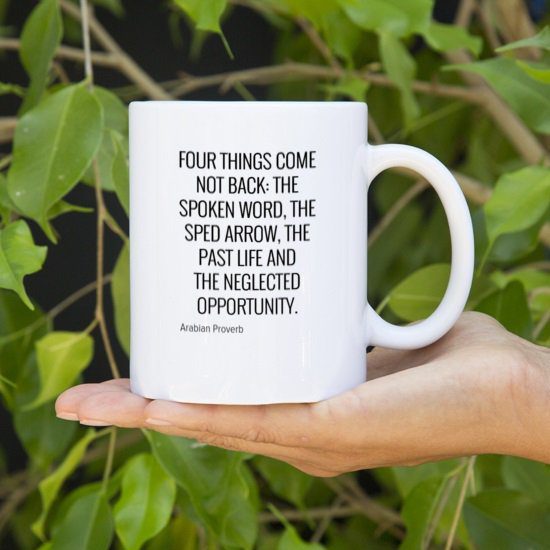
According to a paper published in the 2005 Personality and Social Psychology Bulletin titled: “What We Regret the Most …and Why? Social Psychologist Neal J. Roese and Psychologist Amy Summerville, examined through a meta-analysis of 11 regret ranking studies revealed that the top six biggest regrets in life centers on (in descending order) – Education, Career, Romance, Parenting, The Self and Leisure. Their research findings show that people’s biggest regrets are a reflection of where in life they see their largest opportunities; that is, where they see tangible prospects for change, growth, and renewal.
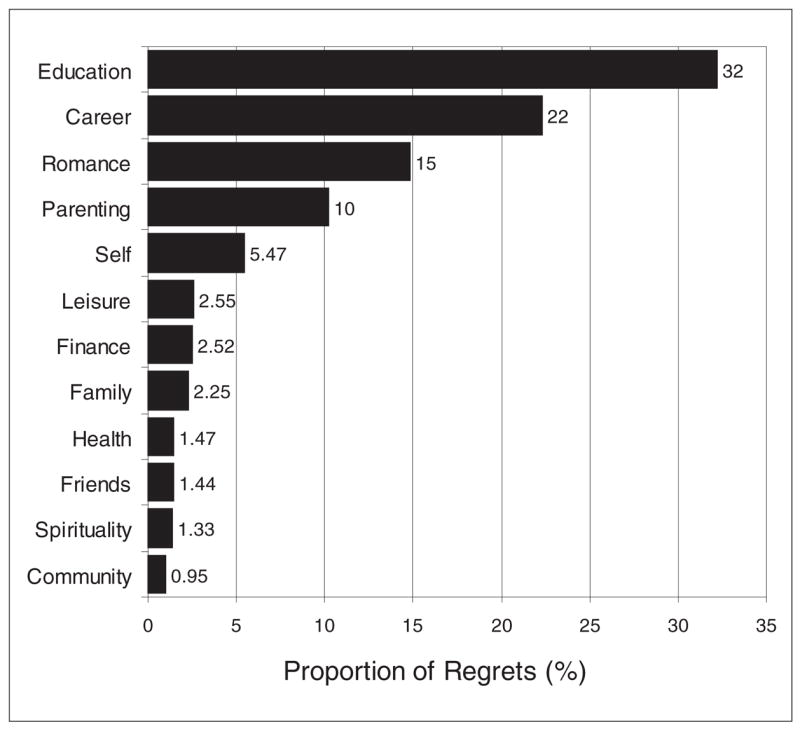
In Better Decisions, Fewer Regrets: 5 Questions to Help You Determine Your Next Move, author and pastor Andy Stanley noted that there are three categories of decisions that create the majority of our regrets: Our Purchases, Relationships, and Habits.
Your regrets are only part of your story. They don’t have to be the story. Your past should remind you. It doesn’t have to define you.
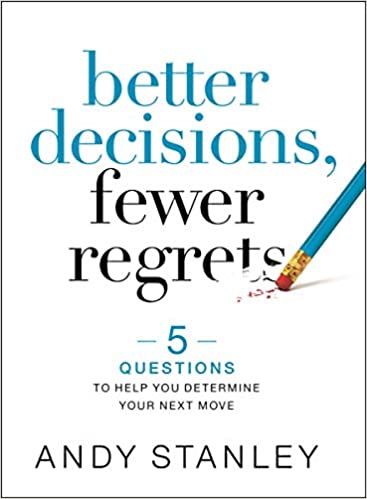
- Purchases – Dumb Purchases
Are you rigorously honest with yourself when it comes to how you spend your money? Your business. I’m concerned about what you tell yourself before the transaction. Listen carefully next time.
2. Relationships – Doomed Relationships
Looking back, we wonder how we missed the signs. How could we have been so clueless? But the problem isn’t that we’re clueless. The problem is, like any good sales associate, we assist ourselves in seeing what we want to see . . . while ignoring all the warning lights flashing right in front of us.
3. Habits – Destructive Habits
You rarely have to sell yourself on the right thing to do, the healthy thing to do, the responsible thing to do. You just know. Good ideas rarely need any defense. When you start selling yourself, you need to hit the pause button and ask, “Am I being completely honest with myself . . . really? If so, why am I selling myself so hard?” The wise thing to do is usually so compelling it doesn’t need selling.
There’s always an internal conflict between the options we intuitively know we should choose and the options we are tempted to choose, between the options that are best for us and the options we sell ourselves on.
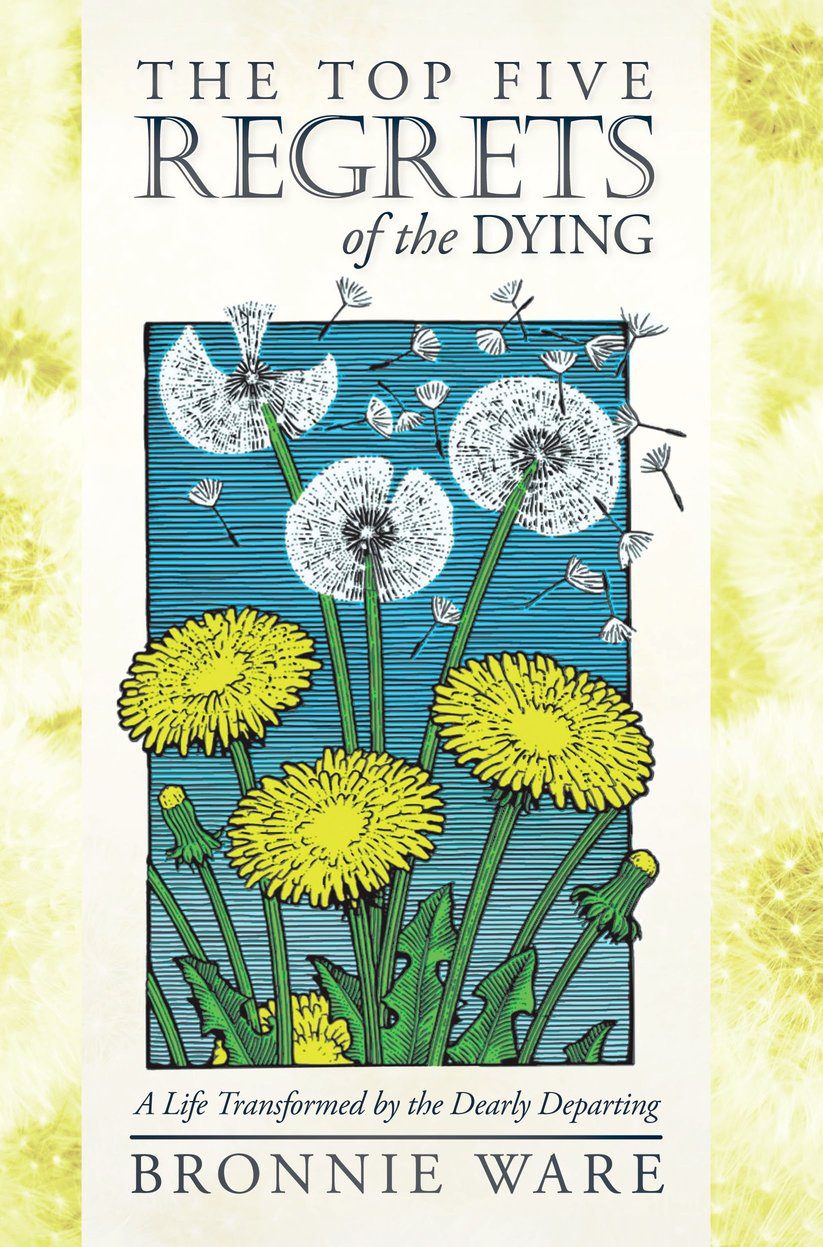
Australian author and former Palliative caregiver Bronnie Ware documented the top 5 deathbed regrets she heard the most from her dying patients. In her book, The Top Five Regrets of the Dying: A Life Transformed by the dearly departing, she listed the top five regrets of the dying as follows:
1. I wish I’d had the courage to live a life true to myself, not the life others expected of me.
2. I wish I hadn’t worked so hard.
3. I wish I’d had the courage to express my feelings.
4. I wish I had stayed in touch with my friends.
5. I wish that I had let myself be happier.
Life is over so quickly. It is possible to reach the end with no regrets. It takes some bravery to live it right, to honour the life you are here to live but the choice is yours. So will be the rewards. Appreciate the time you have left by valuing all of the gifts in your life and that includes especially, your own, amazing self.
American Social Psychologist Daniel Gilbert noted in his TED Talk: The Psychology of your future self:
At every stage of our lives, we make decisions that will profoundly influence the lives of the people we’re going to become, and then when we become those people, we’re not always thrilled with the decisions we made
So young people pay good money to get tattoos removed that teenagers paid good money to get. Middle-aged people rushed to divorce people who young adults rushed to marry. Older adults work hard to lose what middle-aged adults worked hard to gain. On and on and on.
The question is, as a psychologist, that fascinates me is, why do we make decisions that our future selves so often regret?
“Do not obsess about the might-have-beens: “where ignorance is bliss, / ’Tis folly to be wise.”
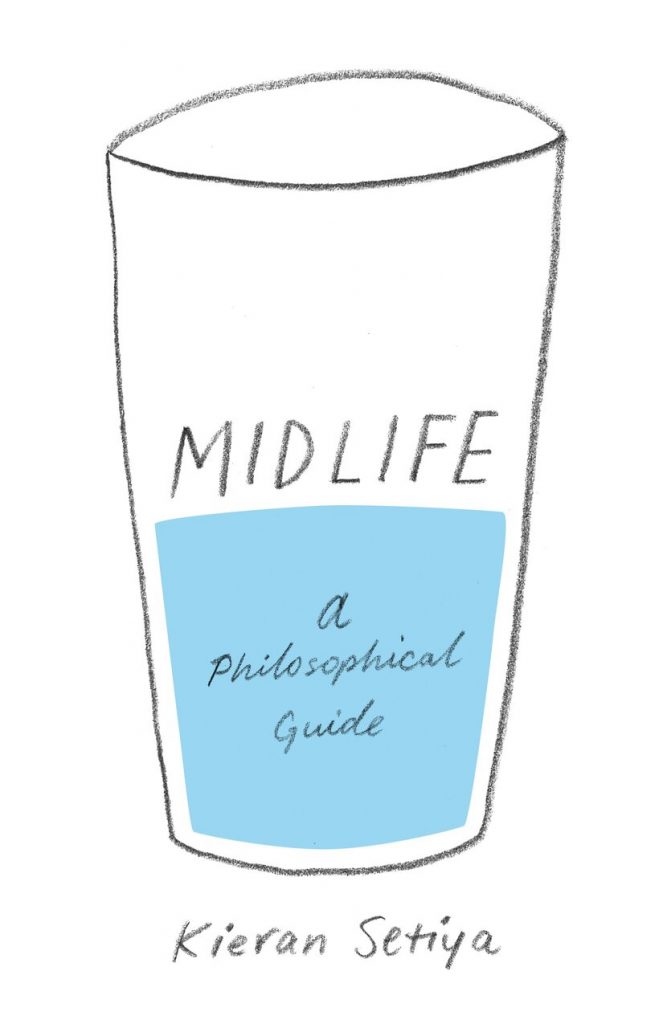
In Midlife: A philosophical guide, MIT Philosopher Kieran Setiya writes:
You may be tempted to take stock, to wrestle with the past. There is nothing wrong with that. But do not make a further mistake, the mistake of stepping back, abstracting from the details of your life, to ask what you should want. In abstracting, you discard a vital source of rational affirmation: not the bare existence of activities, artifacts, relationships, but their impossibly verdant depths. Do not weigh alternatives theoretically, but zoom in:let the specifics count against the grand cartoon of lives unlived. In doing so, you may find you cannot regret what you should have resisted at the time.
Mistakes, misfortunes, failures: no one makes it to midlife without acquiring some of each.
If part of what protects you from regret, or mutes its force, is an asymmetry of knowledge—your comparative ignorance of the lives you could have lived—your tranquility depends on its persistence. In order to avoid regret, you must preserve a measure of oblivion. There is a corresponding threat. The more you know what you are missing, the more you learn what the alternatives would have been and what they would involve, the harder it becomes to let them go. Hence a parting word to the retrospective: be careful what you study, where you choose to train your eye. A little knowledge is harmless; too much can tax your peace of mind.
“In middle age, the limited span of human life is no longer an abstraction. You know from the inside what a decade means; those that remain to you can be counted on one hand. That can be a source of angst.”
As life passes, “[you] have less and less to look forward to, but more and more to look backward to.” And that is just as good. If you can manage it without lapsing into chronophobia, you will have gone a long way toward acceptance of mortality, with philosophical help.
As life passes, “[you] have less and less to look forward to, but more and more to look backward to.”
In his 2014 Maharishi University of Management Commencement Speech, Canadian-American actor Jim Carrey made some great points about how fear controls our lives and the need to step courageously into our greatness without regrets. He said:
So many of us choose our path out of fear disguised as practicality. What we really want seems impossibly out of reach and ridiculous to expect. So we never dare to ask the universe for it.
Sometimes it’s okay to eat your feelings. Now fear is going to be a player in your life, but you get to decide how much. You can spend your whole life imagining ghosts, worrying about the pathway to the future, but all there will ever be is what’s happening here, and the decisions we make in this moment, which are based in either love or fear. So many of us choose our path out of fear disguised as practicality. What we really want seems impossibly out of reach and ridiculous to expect. So we never dare to ask the universe for it. I’m saying I’m the proof that you can ask the universe for it. Please. And if it doesn’t happen for you right away, it’s only because the universe is so busy fulfilling my order. Party size.
I learned many great lessons from my father, not the least of which was that you can fail at what you don’t want so you might as well take a chance on doing what you love.
My father could have been a great comedian, but he didn’t believe that that was possible for him. And so he made a conservative choice. Instead, he got a safe job as an accountant. And when I was 12 years old, he was let go from that safe job and our family had to do whatever we could to survive. I learned many great lessons from my father, not the least of which was that you can fail at what you don’t want so you might as well take a chance on doing what you love.
You can join the game, fight the wars, play with form all you want, but to find real peace you have to let the armor go. Your need for acceptance can make you invisible in this world. Don’t let anything stand in the way of the light that shines through this form. Risk being seen in all of your glory.
Joshua Nash, LPC-S, highlights 3 red-flag behaviors that increase our chances of feeling regret about our decisions and also offers some suggestions on how to avoid these red flags. He writes
RED FLAG: DECISIONS BASED ON OTHER PEOPLE’S WISHES
Literally from birth, we find ourselves surrounded by other people and their wants, expectations, and fears. We come into this world already shadowed by built-up beliefs about how we should be, according to cultural and socioeconomic factors, parental expectations, our gender, and on and on. It’s no wonder we often feel pressured to be and do other than what resonates with our truth.
Because of the pressure to fit in and to please, we can find ourselves making decisions that don’t align with our highest good. From small decisions, like drinking at the party, to life-altering decisions, like getting married, our surroundings impact what we choose to pursue. When we make decisions from the fear of being judged and/or rejected, we doom ourselves to this people-pleasing brand of decision making.
A simple exercise to acquaint yourself with your values is to simply ask the following questions about everything you choose.
- What do I like about this?
- Does this thing support my growth?
- If no one were around to influence me, would I still want to do this?
These questions will be answered by your body-mind through other thoughts, images, and emotions. Listening to them will steer you straight.
RED FLAG: MAKING IMPULSIVE DECISIONS
Impulsive decision-making often gets viewed as wrong or bad because impulsive behavior is seen as “emotional.” Once again, we have society’s misunderstandings about emotion dismissing the importance of emotion in our lives.
Solution
We must learn to fully connect with our emotions. Feeling them fully without comment allows the energetic charge to run its course. After the intensity of the emotion subsides, calm, creative problem-solving can occur. We can learn to regulate our emotions through numerous ways. Dialectical behavior therapy works wonders here, as do mind-body exercises such as tai chi, qigong, yoga, and other breathwork practices.
RED FLAG: BELIEVING OUR MENTAL STORIES
It’s a handy way of looking at our string of thoughts. Storytelling occurs as we “once upon a time” our lives, filling in loads of made-up information to fill in the gaps between aspects of reality we really don’t know or don’t have access to. Storytelling occurs most frequently in relation to the future. So many of us hate uncertainty. Rather than learning to accept the limits of our knowing, we tell stories in an attempt to self-soothe. Anxiety is usually the result.
Solution
Reality testing is a tried-and-true cognitive-behavioral technique used in therapy to help us break away from acting upon our untrue but intensely believed thoughts. In reality testing, we ask the simple question, “How do I know this thought is true?” We are then tasked with the quest of seeking external proof that our thoughts accurately reflect reality. This involves behaving differently, taking risks, and assertively communicating our thoughts, needs, and desires to others.
The recurring theme in all of the above teachings and sayings is that: We should all live our lives courageously because after everything is said and done: “Everyone DIES”. Speak to any old person and you would see what regret really means. They have lots of wisdom but little energy while the young have loads of energy but little wisdom; that is the paradox of life. Our stay here on earth is short but we can strive to make the best use of our existence by living life on our terms. As American actor John Barrymore once said: “A man is not old until regrets take the place of dreams.“.
“A man is not old until regrets take the place of dreams.“. – John Barrymore
We are going to regret the things we did not do and not the things we did do. On our dying beds, we would not be bothered by the number of social media followers we amassed or how hard we worked. What would matter in the end is the number of lives we touched with our work, kindness, service, and excellence.
All the Best in your quest to get Better. Don’t Settle: Live with Passion.



Comments are closed.